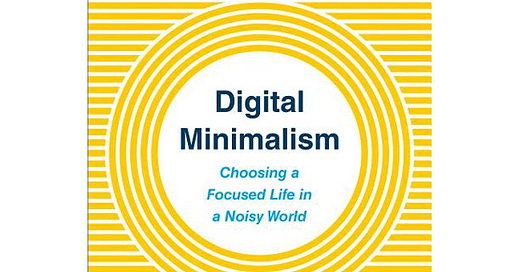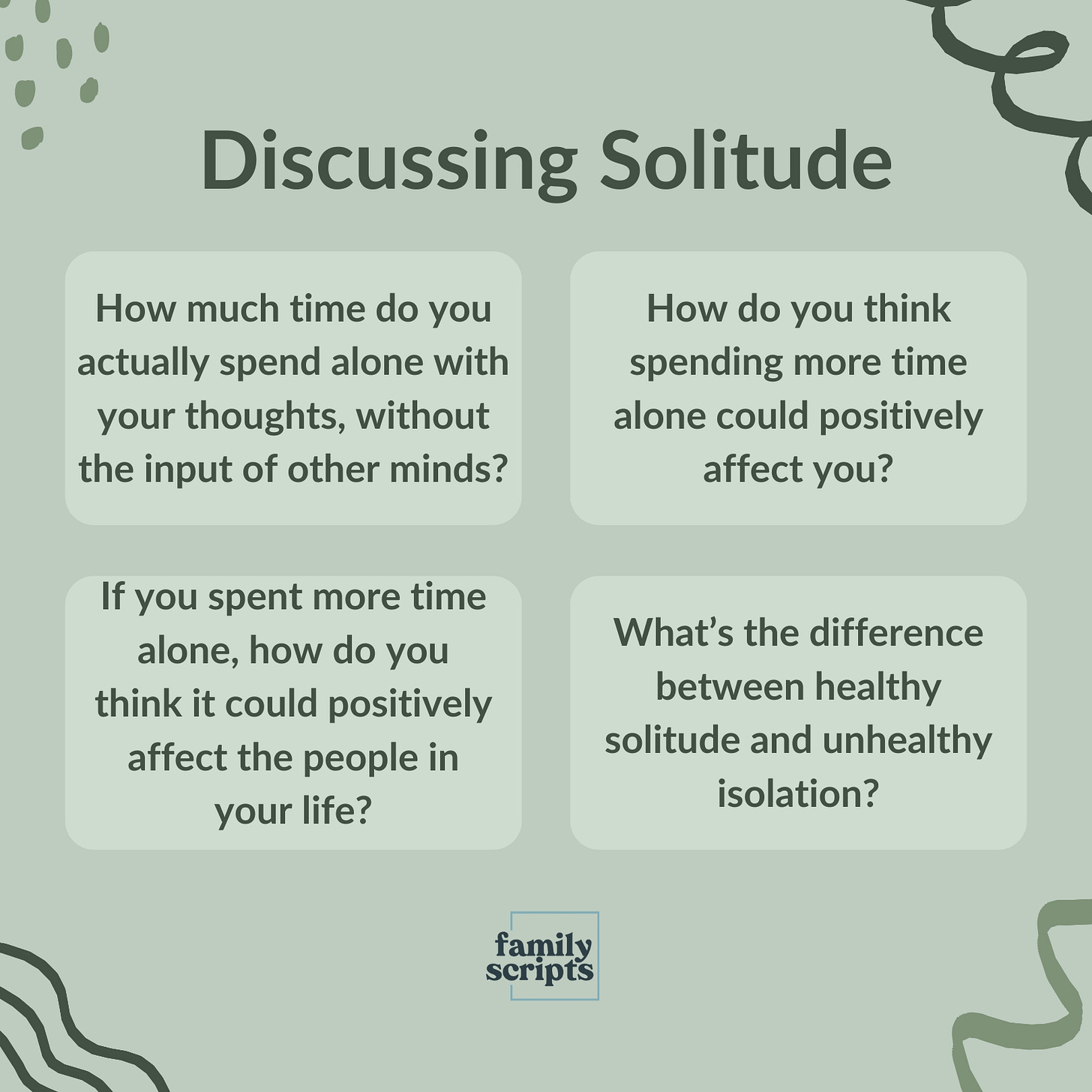10 Quotes and Discussion Questions from Digital Minimalism by Cal Newport 📱
"Humans are not wired to be constantly wired." -Cal Newport
This month we’ve been talking about the value of our own attention, and a book that’s really helped open my eyes to the harm of compulsive tech use is Digital Minimalism by Cal Newport. One of my aims with Family Scripts is to read a bunch of books so you don’t have to 😉 Below I shared ten key quotes from the book followed by some discussion questions that would be great to ask yourself or a contemplative friend.
When the iPhone was created, it wasn’t intended to be a handheld computer on which we spend 6+ hours a day. An original team member for the iPhone said “This was supposed to be an iPod that made phone calls.” (pg 5) None of us were ready for what smartphone technology has morphed into! In what ways has your technology use transformed into something more harmful than you intended?
“Minimizing distraction and respecting users’ attention would reduce revenue. Compulsive use sells.” (pg 12) Would you say you use your phone compulsively? Is it possible that you’ve been devaluing your own attention?
A product manager who helped develop Facebook’s “Like” button is quoted on page 22: “Whatever we’re hoping to see, it never quite meets that bar.” Have you seen this dissatisfaction with yourself and your own reaction to “likes” on your posts? Have you noticed this with content creators who are ultra-popular but still never seem to have enough followers or engagement?
Cal challenges readers to take a 30-day break from optional technologies. “For each optional technology that you’re considering reintroducing into your life, you must first ask: Does this technology directly support something that I deeply value? This is the only condition on which you should let one of these tools into your life.” (pg 75)
Think about the optional technologies in your life (Facebook, Netflix, etc.) How does each of those help you do things you value? Are there any that you think you could do without long-term so you can focus more on your true priorities?“Is this technology the best way to support a value? We justify many of the technologies that tyrannize our time and attention with some tangential connection to something we care about. The minimalist, by contrast, measures the value of these connections and is unimpressed by all but the most robust.” (pg 76)
Think about the peacefulness of a living room with carefully selected furniture and tasteful decorations, in contrast with a crowded room stuffed with stacks of clutter everywhere. Which does the home of your mind look like? What are ways you can minimize your inputs and only let the best stuff stay?In Chapter 4 of Digital Minimalism, Cal Newport gives examples of some leaders such as Abraham Lincoln and MLK Jr. who understood their need for time alone to think—and the rest of the world benefited because of their solitude.
Today, we can completely avoid time alone if we want to, but at what cost to our mental health? “Simply put, humans are not wired to be constantly wired.” (pg 109)
How much time do you actually spend alone with your thoughts, without the input of other minds?
How do you think spending more time alone could positively affect you?
If you spent more time alone, how do you think it could positively affect the people in your life (and maybe even make a big impact on society?)
What’s the difference between healthy solitude and unhealthy isolation?
How can we support each other in our efforts to spend meaningful time alone?
On pg 154, Cal warns that the problem with clicking “like” or texting is that “they teach your mind that connection is a reasonable alternative to conversation.”
Are your digital connections replacing deep conversations with the people around you? Which relationships can you think of that would benefit the most from more in-person interactions?
“Here’s my suggestion: schedule in advance the time you spend on low-quality leisure.” (pg 200)
Earlier in the book, Cal asked how much we’d be willing to pay Facebook (or Instagram, Tiktok, etc.) per hour for the services we need from it. Whew, that would change things! If you want to binge-watch Netflix or browse Twitter, you’ll probably enjoy it more if it’s special, and scheduled. What’s a way you can enjoy screen time on a schedule?
“Declaring freedom from your smartphone is probably the most serious step you can take toward embracing the attention resistance.” (pg 246)
What are some ways you can “dumb-down” your phone to not be so dependent on it?
“In my experience, the key to sustained success with this philosophy is accepting that it’s not really about technology, but is instead more about the quality of your life.” (pg 253)
This is huge. We’re not trying to fight technology addiction because it’s “bad.” We’re trying to fight technology addiction because we want to have higher-quality lives. In what ways would your quality of life be higher with more conversation, productive leisure, solitude, etc.?
I hope this helped you think, and I hope it sparked some interesting conversations with another person. On Monday, I’ll share some encouragement for those who suspect they might be tech-addicted ❤️
Warmly,
Hope from Family Scripts








I love that phrase "productive leisure." I've noticed that I always feel satisfied with my downtime when I've used it to read a book, but not so when I've meandered around YouTube watching various unrelated videos.
GREAT recap of the book and very important points to think about. I have tried the idea of a “drop your phone 📱 off spot” in a designated area for family functions. The problem is we all use them for a camera 📸 too. It has worked at dinner time only. I am dealing with adult children & adults.